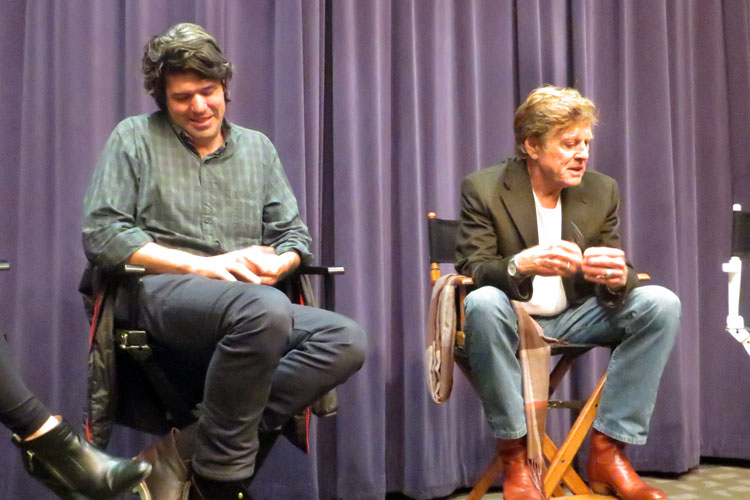The following questions and answers are excerpted from a conversation that followed the NBR screening of All is Lost.
Why did you want to be in this film?
Redford: Because he asked me! In all honesty, I’ve spent many years building an organization to promote independent film, and yet no one has asked me to work in their film. The other reasons were J.C.’s enthusiasm—he’s constantly enthusiastic—and that I loved that this is an idea and a script that he entirely constructed down to the tiniest detail. I thought, here’s a guy who really has a grip on what he wants to do. There was no dialog, I liked that—because that meant you’d take a filter away, take a buffer away, between the story and the audience. And the hope was that if you take words away, it puts an extra stress on the actor—which I wanted—and makes the actor be completely there, completely absorbed in the role they’re playing and the conditions surrounding them. And that would give the audience a chance to come in closer to the actor and experience the journey with him.
“I came into the trade thinking that listening was as important as talking, and that silence had its own value.”
Why did you want to tell this story?
Chandor: While I was editing Margin Call, I was living in Providence Rhode Island and commuting back and forth to the editing room on the train. There were all these boats along the coast from Connecticut to Rhode Island, and that Fall as I was editing, the boat yards next to the train tracks started filling up with boats coming in for the winter. And there’s nothing more depressing than a boat on stilts being stowed away—the whole absurdity of the thing is just sitting there: it’s suddenly an object that has no real function, besides what people feel these things are. And it seemed to me I was looking at fields and fields of adventures that never happened. Whoever bought that boat thought it would bring something more to their life than it probably ever did. So this inspired me to write the letter you hear at the beginning of the film. And then I backed into how this guy ended up in that place, contemplating the end of his life.
Everything depended on what you did, and not at all on what you said. Can you speak about that dynamic?
R: I’ve never been drawn to overacting, from the time I became an actor in the first place. I came into the trade thinking that listening was as important as talking, and that silence had its own value. This was a chance to express that. If you take words out of the picture, there’s a direct line of communication between you and the audience. The fact that the character didn’t have much time to think, that he really only had time to act and go on instinct… as an actor, I really liked that. I liked that challenge.
C: We had a couple of core concepts regarding the character. We both agreed that the man had a community—he was not just sailing around the world alone for twenty years like a maniac. The boat had certain details that gives away that he’s not a professional, or a super-sailor; he’s an accomplished amateur who has built up his boat to try to make it seaworthy for this journey. This was an adventure he was going on. He had a community, a family… he was leaving something. There was a real sense of purpose to this. The other big thing is that this was not just a suicide mission. He went out believing to his core that he was coming back.
R: There was just enough indication in the opening note to go on. He says, “I tried, I think you know I tried.” He’s talking about a family. There’s something unfulfilled. There’s something that didn’t quite happen the way it should have, or the way he wanted it to. And therefore you can assume that this journey is an effort to fulfill something that didn’t happen in his life. This journey represents the completion of something that didn’t occur. And that’s all I needed as a character.

